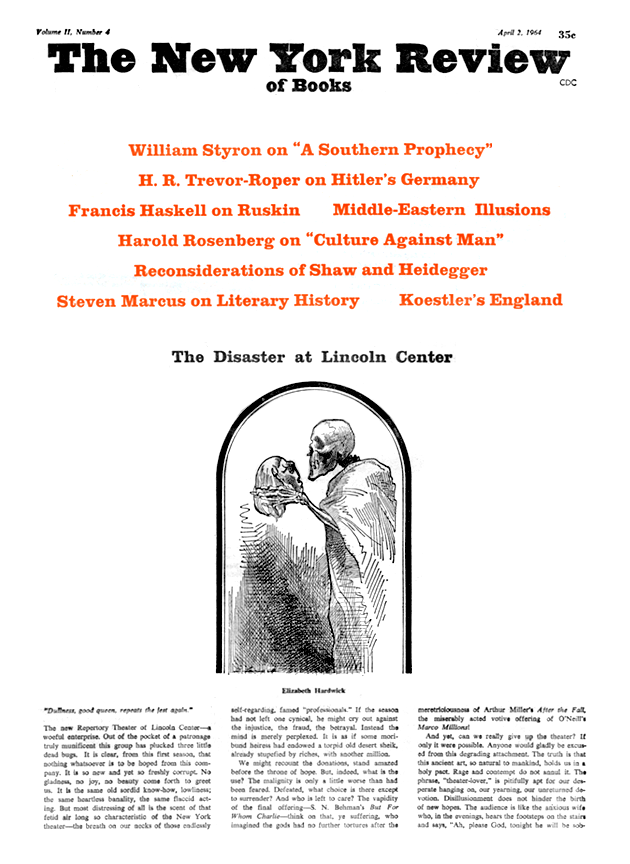With the exception of Cyprus, the Middle East furnishes few headlines in the world’s press now, nor does it stand high on the list of problems that give diplomats sleepless nights. Yet ten or even five years ago, an American President had to interrupt a round of golf to attend to some sudden crisis in a remote Middle Eastern country that most Americans (and in fact most Russians) had barely even heard of. To the West, the Middle East was important for several reasons, not the least of which were the presence of rich oil fields and strategic bases there. Neutralist in foreign policy—to the consternation of the late Mr. Dulles—the Arab countries seemed in addition to have virtually a monolopy of political instability.
The situation has now changed considerably, for which we have every reason to be grateful. With the development of modern rocket techniques, most of the military bases have been given up, and those that remain are no longer essential. There has been a buyer’s market in oil, and nobody but the oil companies would be worse off if the Middle Eastern installations closed down for a year or two, or even longer. Everybody in the West is now reconciled to the fact that most Middle Eastern countries take money and arms from both East and West, and, generally speaking, pursue neutralist policies. Their monopoly of political instability has long since been destroyed; political developments are far less predictable and events more stormy in some parts of Africa, Asia, and Latin America than in the Middle East. The big newspaper headlines of 1954 tended to make us forget that the Middle East was not one of the world’s most important areas, nor, incidentially, one of its most populous ones (its population is not larger than Indonesia).
We can now observe events in the Middle East with greater detachment. A major crisis may recur there in certain circumstances, but, on the whole, there is more calm in the area now than at any time since the end of the Second World War. Middle Eastern political leaders certainly feel less self-important; even President Nasser’s longest speech does not rate more than a few lines in the world’s press, and the most momentous decision of the Turkish, Lebanese, or Israeli parliaments does not get much more publicity.
For better or worse, all this has not influenced the flow of literature about the Middle East. It is my impression, however, that its quality has improved, except for some silly and pretentious books by political scientists who seem to be the worst offenders these days. It is certainly the first time in the memory of the present writer that he has been asked to review four books at once that are highly competent, in which there is hardly a word with which he disagrees, and of which at least one is excellent.
Professor Bernard Lewis, who heads the department of history at the London School of Oriental Studies, has long been known as the author of several first-rate studies both in his own field of specialization (Turkey) and in that of the Middle East in general. His new book, based on six lectures at Indiana University, is the first of a series of Encounter studies and is certainly the best short book on the Middle East known to this reviewer. It is a work of the highest level, combining elegance of style with an easy mastery of the subject. This is probably one of the best books on any historical-political subject in recent years, and should serve as a model for the writings of assistant professors all over the world (and some of their seniors).
Professor Lewis defines the Middle East as a historical, geographical, and cultural entity, shows what the West meant (and still means) to Middle Easterners, and traces the main political and intellectual movements in recent times. The last essay in the book, which deals with the place of the Middle East in world affairs, describes the double standard most Arab governments apply vis-à-vis Russia and the West: Arab leaders accept Russian scolding quietly, and at the same time are violently provoked by the mildest Western comment. They pocket Western gifts surreptitiously while loudly acclaiming Russian loans. Public opinion is anti-Western, and no Arab statesman dares risk his life by close association with the West.
This reaction has surprised and pained American diplomats for a long time, and many of them have decided that the unfortunate association of West European imperialism with Zionism is at the root of the evil. In their view, if only American foreign policy could dissociate itself from these allies there would result (as Professor Lewis puts it) an idyllic marriage of American interests and Arab nationalism, with bases for the military, treaties for the diplomats, concessions for the businessmen, and converts for the missionaries. Fortunately, more realistic views are beginning to prevail. It is now realized that the cause of the discontent in the Middle East is not the conflict between states or nations, but between civilizations, a continuation of the great debate, as Gibbon called it, between Christianity and Islam. When the illusions of Middle Eastern superiority over the West were finally shattered in the nineteenth century, the mood of the Easterner changed
Advertisement
…from ignorant complacency to anxious emulation. The West was great and strong; by study and imitation, it might be possible to discover and apply the elusive secret of its greatness and strength, and generations of eager students and reformers joined in the search. They may not have loved us, but they did admire and respect us. Today they usually do neither. The mood of admiration and imitation has given way to one of envious rancour…
The Middle East and the West is concerned with the causes of this unfortunate state of affairs, which, needless to say, prevails in other parts of the world as well. Its conclusion, however, is not a pessimistic one; on the contrary, there are signs that anti-Western feeling has passed its peak, and that relations between the Arab world and the West may improve if the West disengages itself still further from Arab policies. Neither total repression nor appeasement is likely to promote this; in the case of the latter, friendship will be possible only when Arab nationalism is prepared to come to terms with the West.
It is unfair to measure Messrs. Cremeans, Issawi, and Hirszowicz by the standard set by Professor Lewis’s book. Their books, good as they are, are of a more specialized nature, and hence are of interest to a more limited audience. And, indeed, the Egyptian railway system is not a rewarding background for the display of intellectual prowess.
Dr. Hirszowicz, who works at the Polish Academy of Science and has first-hand knowledge of the Middle East, has written a comprehensive study of German policy in the Middle East during the Nazi period—its generally successful attempts to win favor with the Arabs, its intrigues in Syria, Iraq, and Palestine, its activities during the war in North Africa. The author is one of the few historians who has had access to archives in both West and East, and it is to be hoped that his painstakingly documented study will appear in English in the near future. It is a major contribution to the historiography of the Third Reich, perhaps the first to come out of a Communist country.
Mr. Cremeans’s book is full of good sense. It is well informed and admirably balanced (even on the Arab-Isracli conflict). My only quarrel with it is that it takes Nasser too seriously. The cardinal flaw of Western policy in the Arab world is not really that it offended and appeased Nasser by turns, but that it overrated Egypt’s importance—but then, most of us have erred in this direction. Egypt under Nasser has taken a place in world affairs out of any proportion to its real importance and strength. This is not so much a result of political mismanagement as of poverty: there is no solution for Egypt’s economic and demographic problems, and all that can be done is to keep the country afloat by massive donations from both East and West, until some major technological breakthrough—the use of cheap nuclear or solar energy, for example—provides a way out.
How desperate Egypt’s situation really is emerges from Professor Issawi’s book. Issawi is the world’s foremost authority on Egypt, but his view has been, until now, generally optimistic. In a review of a book of mine some eight or ten years ago, he wrote that everything would be fine if only the West played its cards right in the Middle East. He is far less hopeful now, and in this book he suggests that Egypt under Nasser is moving “at best [towards] a Titoist system and at worst to the economics of neo-barbarism.” I have strong doubts whether even the economics of neo-barbarism would succeed in Egypt—even a Stalin could fail in a country so desperately poor and so lacking in natural resources. This is not Nasser’s fault, but it will inescapably lead to a considerable decrease in the status on the international scene that Egypt has enjoyed for a decade.
This Issue
April 2, 1964



